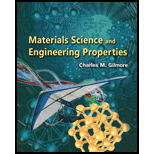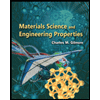
Materials Science And Engineering Properties
1st Edition
ISBN: 9781111988609
Author: Charles Gilmore
Publisher: Cengage Learning
expand_more
expand_more
format_list_bulleted
Question
Chapter 3, Problem 23CQ
To determine
To fill:
The correct term in the given blank.
Introduction:
A polymer is formed when small-molecule combine with each other. This small unit is known as a monomer. All monomers are bond together with some force.
Expert Solution & Answer
Want to see the full answer?
Check out a sample textbook solution
Students have asked these similar questions
Question 3 (20 points): The traffic volume on a 2-lane highway is 1600 veh/hr in each direction
Page 3 of 6
with a density of 20 veh/mi. A large dump truck enters the traffic stream from an adjacent
construction site at 20 mph and carries on this way for 2 miles before turning off to the dump
site. Because flow is so high in the opposite direction, no one can pass the truck. As a result,
traffic back up behind the truck at four times the density (i.e., 4x20 = 80 veh/mi) at a volume of
1000 veh/hr. How many vehicles get caught in the traffic congestion before the truck exits the
highway?
How can construction project managers find a balance between speeding up schedules and the risks of making more mistakes and needing rework, especially when using methods like fast tracking?
Help i keep getting the wrong answer. So I must be doing something wrong.
Chapter 3 Solutions
Materials Science And Engineering Properties
Ch. 3 - Prob. 1CQCh. 3 - Prob. 2CQCh. 3 - Prob. 3CQCh. 3 - Prob. 4CQCh. 3 - Prob. 5CQCh. 3 - Prob. 6CQCh. 3 - Prob. 7CQCh. 3 - Prob. 8CQCh. 3 - Prob. 9CQCh. 3 - Prob. 10CQ
Ch. 3 - Prob. 11CQCh. 3 - Prob. 12CQCh. 3 - Prob. 13CQCh. 3 - Prob. 14CQCh. 3 - Prob. 15CQCh. 3 - Prob. 16CQCh. 3 - Prob. 17CQCh. 3 - Prob. 18CQCh. 3 - Prob. 19CQCh. 3 - Prob. 20CQCh. 3 - Prob. 21CQCh. 3 - Prob. 22CQCh. 3 - Prob. 23CQCh. 3 - Prob. 24CQCh. 3 - Prob. 25CQCh. 3 - Prob. 26CQCh. 3 - Prob. 27CQCh. 3 - Prob. 28CQCh. 3 - Prob. 29CQCh. 3 - Prob. 30CQCh. 3 - Prob. 31CQCh. 3 - Prob. 32CQCh. 3 - Prob. 33CQCh. 3 - Prob. 1ETSQCh. 3 - Prob. 2ETSQCh. 3 - Prob. 3ETSQCh. 3 - Prob. 4ETSQCh. 3 - Prob. 5ETSQCh. 3 - Prob. 6ETSQCh. 3 - Prob. 7ETSQCh. 3 - Prob. 1DRQCh. 3 - Prob. 2DRQCh. 3 - Prob. 3DRQCh. 3 - Prob. 3.1PCh. 3 - Prob. 3.2PCh. 3 - Prob. 3.3PCh. 3 - Prob. 3.4PCh. 3 - Prob. 3.5PCh. 3 - Prob. 3.6PCh. 3 - Prob. 3.7PCh. 3 - Prob. 3.8PCh. 3 - Prob. 3.9PCh. 3 - Prob. 3.10PCh. 3 - Prob. 3.11PCh. 3 - Prob. 3.12PCh. 3 - Prob. 3.13PCh. 3 - Prob. 3.14P
Knowledge Booster
Similar questions
- 6000 units have been installed to date with 9,000 units to install. Labor costs are $23,300.00 to date. What is the unit cost for labor to date?arrow_forwardThe base rate for labor is $15/hr. The labor burden is 35% and 3% for small tools for the labor. There are 1000 units to install. Records indicate that trade workers can install 10 units per hour, per trade worker. The owners need 15% overhead and profit to pay bills, pay interest on loan and provide some profit to the partners. What is the minimum bid assuming no risk avoidance factor?arrow_forwardCan you show me how to obtain these answers thanks, will rate!arrow_forward
- I have the answers for part a just need help with b mostly thanksarrow_forwardPlease explain step by step and show formulasarrow_forward5. (20 Points) Consider a channel width change in the same 7-foot wide rectangular in Problem 4. The horizontal channel narrows as depicted below. The flow rate is 90 cfs, and the energy loss (headloss) through the transition is 0.05 feet. The water depth at the entrance to the transition is initially 4'. 1 b₁ TOTAL ENERGY LINE V² 129 У1 I b₂ TOP VIEW 2 PROFILE VIEW h₁ = 0.05 EGL Y₂ = ? a) b) c) 2 Determine the width, b₂ that will cause a choke at location 2. Determine the water depth at the downstream end of the channel transition (y₂) section if b₂ = 5 feet. Calculate the change in water level after the transition. Plot the specific energy diagram showing all key points. Provide printout in homework. d) What will occur if b₂ = = 1.5 ft.?arrow_forward
- 4. (20 Points) A transition section has been proposed to raise the bed level a height Dz in a 7-foot wide rectangular channel. The design flow rate in the channel is 90 cfs, and the energy loss (headloss) through the transition is 0.05 feet. The water depth at the entrance to the transition section is initially 4 feet. b₁ = b = b2 1 TOTAL ENERGY LINE V² 129 Ут TOP VIEW 2 hloss = 0.05 " EGL Y₂ = ? PROFILE VIEW a) Determine the minimum bed level rise, Dz, which will choke the flow. b) If the step height, Dz = 1 ft, determine the water depth (y2) at the downstream end of the channel transition section. Calculate the amount the water level drops or rises over the step. c) Plot the specific energy diagram showing all key points. Provide printout in Bework. d) What will occur if Dz = 3.0 ft.?. Crest Front Viewarrow_forward1. (20 Points) Determine the critical depth in the trapezoidal drainage ditch shown below. The slope of the ditch is 0.0016, the side slopes are 1V:2.5H, the bottom width is b = 14', and the design discharge is 500 cfs. At this discharge the depth is y = 4.25'. Also, determine the flow regime and calculate the Froude number. Ye= ? Z barrow_forward3. (20 Points) A broad crested weir, 10 feet high, will be constructed in a rectangular channel B feet wide. The weir crest extends a length of B = 120 feet between the banks with 2 - 4 foot wide, round nosed piers in the channel. The width of the weir crest is 8 feet. If H = 6', determine the design discharge for the weir.arrow_forward
arrow_back_ios
SEE MORE QUESTIONS
arrow_forward_ios
Recommended textbooks for you
 Materials Science And Engineering PropertiesCivil EngineeringISBN:9781111988609Author:Charles GilmorePublisher:Cengage Learning
Materials Science And Engineering PropertiesCivil EngineeringISBN:9781111988609Author:Charles GilmorePublisher:Cengage Learning

Materials Science And Engineering Properties
Civil Engineering
ISBN:9781111988609
Author:Charles Gilmore
Publisher:Cengage Learning